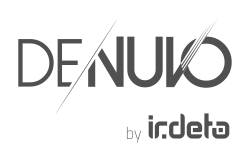History
Denuvo is developed by Denuvo Software Solutions GmbH, a software company based in Salzburg, Austria. [1] The company was formed through a management buyout of DigitalWorks, the arm of the Sony Digital Audio Disc Corporation that developed the SecuROM DRM technology. [2] In January 2018, the company and its 45 employees were acquired by the software company Irdeto. [3] [4] Development of the Denuvo software started in 2014. [1] FIFA 15 , released in September 2014, was the first game to use Denuvo. [5]
3DM, a Chinese warez group, first claimed to have breached Denuvo's technology in a blog post published on 1 December 2014, wherein they announced that they would release cracked versions of Denuvo-protected games FIFA 15, Dragon Age: Inquisition and Lords of the Fallen . [6] Following onto this, 3DM released the version of Dragon Age: Inquisition about two weeks after that game had shipped. [6] The overall cracking progress took about a month, an unusually long time in the game cracking scene. [2] [7] When asked about this development, Denuvo Software Solutions acknowledged that "every protected game eventually gets cracked". [2] However, technology website Ars Technica noted that most sales for major games happen within 30 days of release, and so publishers might consider Denuvo a success if it meant a game took significantly longer to be cracked. [8] In January 2016, 3DM's founder, Bird Sister, revealed that they were to give up on trying to break the Denuvo implementation for Just Cause 3 , and warned that, due to the ongoing trend for the implementation, there would be "no free games to play in the world" in the near future. [9] Subsequently, 3DM opted to not crack any games for one year to examine whether such a move would have any influence on game sales. [10] Denuvo's marketing director, Thomas Goebl, claimed that some console-exclusive games get PC releases due to this technology. [11]
By October 2017, crackers were able to bypass Denuvo's protection within hours of a game's release, with notable examples being South Park: The Fractured but Whole , Middle-earth: Shadow of War , Total War: Warhammer II and FIFA 18 , all being cracked on their release dates. [12] In another notable case, Assassin's Creed Origins , which wrapped Denuvo within security tool VMProtect as well as Ubisoft's proprietary DRM used for their Uplay distribution software, had its security features bypassed by Italian collective CPY in February 2018, three months after the game's release. [13] In December 2018, Hitman 2 's protection was bypassed three days before its official release date, due to exclusive pre-order access, drawing comparisons to Final Fantasy XV , which had its protection removed four days before release. [14]
By 2019, games like Devil May Cry 5 , Metro Exodus , Resident Evil 2 , Far Cry New Dawn , Football Manager 2019 , and Soul Calibur 6 were cracked within their week of release. [14] [15] In the case of Rage 2 , which was released on Steam as well as Bethesda Softworks' own Bethesda Launcher, the Steam version was protected by Denuvo, whereas the Bethesda Launcher version was not, leading to the game being cracked immediately, and Denuvo being removed from the Steam release two days later. [16] [17]
An anti-cheat sister product, Denuvo Anti-Cheat, was announced in March 2019. [18] It was first used by Doom Eternal following an update in May 2020, although this change was reverted within a week after negative player feedback. [19] [20] In August 2022, Irdeto announced Nintendo Switch Emulator Protection, a DRM system for Nintendo Switch games that aims to prevent them from being emulated with programmes like Yuzu. Nintendo Switch owners widely criticised the announcement on social media, expressing concerns that it would decrease game performance. [21] [22] In response, Denuvo stated that the system would cause no performance impact on genuine hardware. [23] [24] The system was released in August 2023. [25]
Criticism
Denuvo has been criticised for increasing CPU utilisation resulting in protected software having degraded performance relative to native code. Denuvo Software Solutions has denied this claim. [28] In the case of Tekken 7 and Sonic Mania Plus , Denuvo caused a significant decrease in performance in several parts of the games. [29] [30] Sam Machkovech of Ars Technica reviewed in-depth how Denuvo was causing performance penalties, releasing an article on the matter in December 2018. [31] In December 2018, Joel Hruska of ExtremeTech compared the performance of multiple games that use Denuvo and found that the games had significantly higher frame rates and lower loading times when the DRM system was disabled. [32] Richard Leadbetter of Digital Foundry found that a pirated version of Resident Evil Village that removed Capcom's in-house DRM, which was protected by Denuvo, performed significantly better than the retail version. [33] Capcom later released a patch for Village that, among other changes, altered how the game used Denuvo. [34] Leadbetter noted that the patch improved performance, running equivalent to the pirated version. [35]
In November 2021, several recent games using Denuvo were rendered unplayable, reportedly due to a Denuvo-owned domain name expiring. [36] In the same month, it was reported that Denuvo Anti-Tamper was incompatible with Windows 10 and Windows 11 systems running on CPUs in the Alder Lake series. [37] This was fixed by January 2022. [38]
On October 18, 2024, Denuvo launched its official Discord server as part of a PR campaign, which they claim is an important step toward building stronger connections with game developers, publishers, and players. [39] [40] Later, Denuvo's Product manager Andreas Ullmann claimed, "moderating a group of users who dislike DRM is proving to be challenging, so the admins are shutting down and reopening Discord discussions day by day instead of keeping the server active always". [41]
